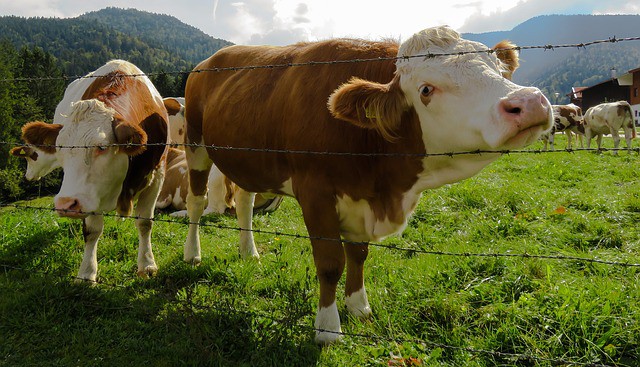

Grazing management plans play a key role in determining fencing selection. Decades ago, once the fence posts were in the ground and the woven or strand wire was run, the animals were simply turned out. Pastures weren’t rotated or rested with regularity. Today, rotational grazing is a critical component of farm management. For that reason, portable fencing can be a good fit. Portable fencing costs a little more, but it’s versatile: You can roll it up and move it somewhere else. You can also store it, and you can sell it.
If you decide to get out of the business, you can sell portable fencing; you can’t sell posts and wire that are permanently in the ground.
You can pick up and move portable panels, maximizing flexibility in facility design and animal movement. Panels come in different gauge or diameter of pipe. Heavy weight gauge is more suitable for confining large bulls, compared with light gauge pipe that is more appropriate for sheep and goats.
Sheep and goats need smaller spacing between the horizontal pieces to prevent escape. Pigs and cattle panels are another portable panel option. These are made of heavy gauge steel from 1⁄4 to 3⁄8 inches in diameter, welded together in squares. They are 3 to 4 feet high and usually come in 16-foot lengths. These panels can be nailed to posts with staples or clipped or wired to T-posts.
Fence Fundamentals
There are a variety of fencing options including woven, barbed and high-tensile (electric and nonelectric) wire. PVC and post and rail are other options. Here’s a rundown of some of the most common types.
High-Tensile: Also known as multi-strand or temporary, high-tensile single-strand fencing systems can be permanent or designed to be easily moved and reset. They are typically electrified so that an animal is shocked if it touches the fence. For cattle and horses, high-tensile fences tend to be 4 to 5 feet high.
Woven: Also called field wire, this type of fencing has small rectangular squares. The squares are narrow enough so that sheep and goats can’t get their heads or horns stuck if they put their head through the fence.
Netting: This basic electric fence is designed for chickens, ducks and other nonflying poultry. It’s available in a variety of heights and, depending on the model, can be permanent or semi-permanent.
Barbed Wire: This type of steel fencing wire is constructed with sharp edges or points arranged at intervals along the strands. Because it’s relatively inexpensive, it’s commonly used on large expanses of rangelands.
Post and Rail: Made from wood or PVC vinyl materials, post and rail is aesthetically pleasing and well-suited for multiple animal types. With electrified standoff wires or woven fencing between the bottom rail and the ground means it can be converted to accommodate a wider range of animal species; this is a costlier option that requires regular maintenance.
Round Pen Panels: This is a nonelectric portable fencing option. The panels come in an assortment of height and lengths.
Panels: Hog and cattle panels are made of heavy gauge steel 1⁄4 to 3⁄8 inches in diameter, welded together in squares. They are 3 to 4 feet high and usually come in 16-foot lengths.
Get Creative
Be flexible in your mindset and get opinions from other farmers. Ask them why they use different types of fencing and what has worked best.
Finances play a key role in selection. People tend to prefer more expensive options but often have limited budgets. Being conscientious is prudent, but going cheap is costly—and potentially dangerous—in the long run. It’s better to spend a little more on better quality materials than cheapen out.
Fences are a key component to success with livestock. Take the time necessary to choose, and build the best possible fencing. Researching your options and strategically choosing a fencing system rather than jumping in an buying supplies can save you time and money while setting you up for success.
 Contact Jaguza Support
Contact Jaguza Support